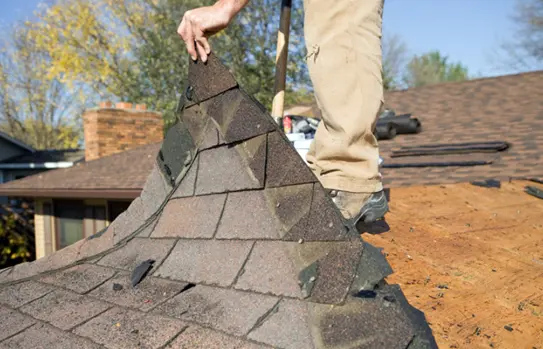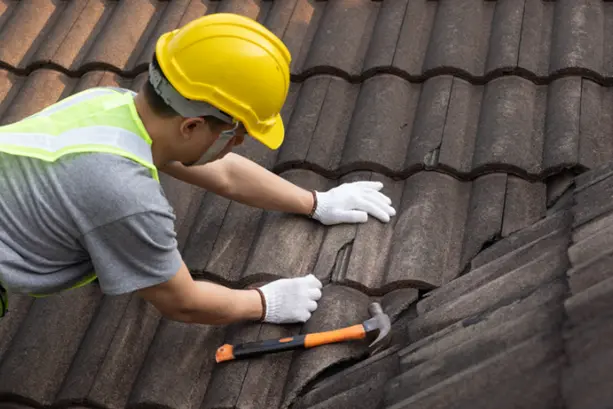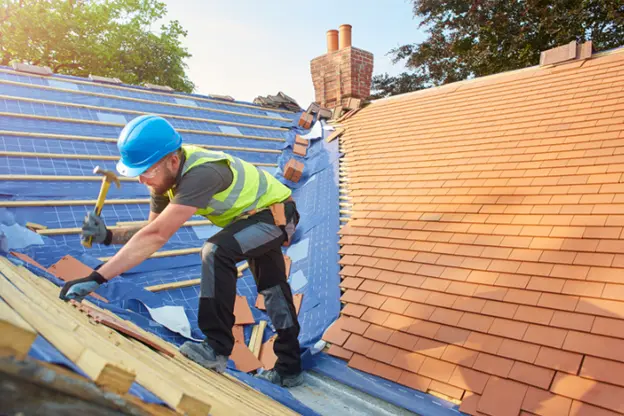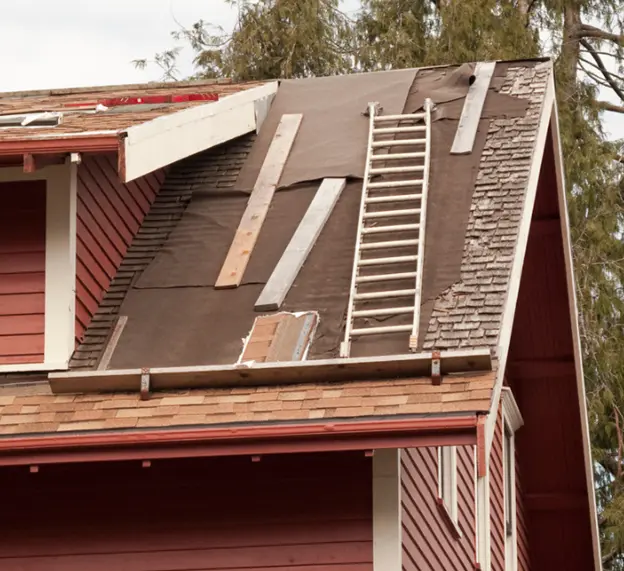Understanding the condition of your roof is essential for preserving both the structural integrity of your home and its overall value. When roofing issues occur, deciding between repair and replacement can be complex, influenced by factors such as the extent of the damage, the age of the roof, and long-term financial considerations.
This article will guide you through these key factors, helping you make an informed decision that ensures your home remains a safe and valuable asset.
Signs that your roof needs attention
The first step in determining whether you need a roof repair or roof replacement is to identify the signs that your roof requires attention. Some common indicators include:
- Leaks or water damage in your attic or ceilings
- Visible damage to shingles, tiles, or other roofing materials
- Cracked, curling, or missing shingles
- Excessive granule loss on asphalt shingles
- Discoloration or moss growth on the roof
- Sagging or uneven roof structure
If you notice any of these issues, it’s essential to have a professional roofing contractor inspect your roof to assess the extent of the damage and provide recommendations.
Understanding the difference between roof repair and roof replacement
Roof repair and roof replacement are two different strategies for addressing roofing issues. Roof repair focuses on fixing specific problems or damaged areas of your existing roof, making it a more cost-effective option as it targets only the affected sections. On the other hand, roof replacement involves completely removing the old roofing system and installing a new one.
While roof repair can be a suitable choice for localized damage, if the damage is extensive or your roof is approaching the end of its lifespan, a full replacement might be a better long-term solution. This ensures that you address underlying issues and enhance the overall durability and performance of your roofing system.

Factors to consider when deciding between roof repair and roof replacement
When deciding between roof repair and roof replacement, there are several key factors to consider:
- Age and condition of the existing roof: If your roof is relatively new and the damage is limited, a repair may be the best option. However, if your roof is older and the damage is widespread, a replacement may be more practical.
- The extent of the damage: If the damage is confined to a small area, a repair may be sufficient. But if the damage is extensive, a replacement may be the better choice to ensure the long-term integrity of your roof.
- Roof lifespan: Different roofing materials have varying lifespans, typically ranging from 20 to 50 years. If your roof is nearing the end of its lifespan, a replacement may be more cost-effective in the long run.
- Energy efficiency: Newer roofing materials and systems can often improve the energy efficiency of your home, potentially leading to lower utility costs.
- Aesthetics: If you’re looking to update the appearance of your home, a roof replacement may be an opportunity to explore different roofing styles and materials that better complement your home’s design.
- Local building codes and regulations: Depending on your location, there may be specific building codes or regulations that dictate when a roof replacement is required.
The cost of roof repair vs. roof replacement
The cost of roof repair and roof replacement can vary widely based on factors such as the size of your roof, the type of materials used, and the extent of the work required.
Typically, roof repairs for minor issues range from $300 to $1,500, while more extensive repairs can cost between $1,500 and $7,000. In contrast, a full roof replacement generally ranges from $10,000 to $30,000 or more, depending on the size of your home and the chosen roofing materials.
Although roof replacement involves a higher upfront cost, it offers long-term benefits, including enhanced energy efficiency, increased home value, and reduced maintenance costs over the life of the new constuction roof.

Pros and cons of roof repair
Pros of roof repair:
- More cost-effective than a full replacement
- Can extend the lifespan of your existing roof
- Minimizes disruption to your home and daily life
- Allows you to maintain the current aesthetic of your roof
Cons of roof repair:
- Temporary fix, as the underlying issues may persist
- Repairs may not address the root cause of the problem
- Repeated repairs can add up over time, potentially exceeding the cost of a replacement
- Repaired areas may not match the appearance of the rest of the roof

Pros and cons of roof replacement
Pros of roof replacement:
- Completely addresses the underlying issues with your roof
- Provides a fresh, updated look for your home
- Improves energy efficiency and can lower utility costs
- Increases the overall value of your property
- Offers a longer lifespan than repeated repairs
Cons of roof replacement:
- Significantly more expensive upfront
- Requires more disruption to your home during the installation process
- May need to obtain permits and comply with local building codes
- Disposal of the old roofing materials can be an additional cost
Types of roof repairs for different roofing systems
The types of roof repairs required can vary depending on the roofing system installed on your home. Some common roof repair options include:
Asphalt shingle roofs:
- Replacing damaged or missing shingles
- Repairing flashing and sealants
- Addressing issues with the roof’s ventilation system
Metal roofs:
- Repairing or replacing rusted or damaged metal panels
- Fixing issues with the roof’s sealants and fasteners
- Addressing problems with the roof’s underlayment
Flat or low-slope roofs:
- Patching or repairing cracks, blisters, or holes in the roofing membrane
- Replacing deteriorated flashing and sealants
- Addressing issues with the roof’s drainage system
Tile or slate roofs:
- Replacing broken or cracked tiles or slates
- Repairing issues with the roof’s underlayment and fasteners
- Addressing problems with the roof’s waterproofing system
Types of roof replacement options
When it comes to roof replacement, there are several roofing materials to choose from, each with its own unique characteristics and benefits:
- Asphalt shingles: The most common and affordable option, available in a variety of styles and colors.
- Metal roofing: Durable, long-lasting, and fire-resistant, with a wide range of design options.
- Tile roofing: Offers a classic, Mediterranean-inspired look and excellent durability, but can be more expensive.
- Slate roofing: Highly durable and long-lasting, but also one of the most expensive roofing options.
- Flat or low-slope roofing: Typically made of materials like TPO, EPDM, or modified bitumen, suitable for commercial roofing and some residential applications.
The choice of roofing material will depend on your budget, the architectural style of your home, and your personal preferences.

Tips for maintaining your roof to avoid costly repairs or replacements
To prolong the life of your roof and avoid the need for costly repairs or replacements, consider the following maintenance tips:
- Regularly inspect your roof: Conduct visual inspections of your roof at least twice a year, looking for signs of wear, damage, or potential issues.
- Clean and maintain your gutters: Ensure your gutters are free of debris to allow proper drainage and prevent water buildup.
- Trim overhanging trees and branches: Remove any branches or trees that could potentially rub against or fall on your roof.
- Address issues promptly: If you notice any problems, such as leaks or damaged shingles, address them as soon as possible to prevent further deterioration.
- Consider roof coatings or sealants: Applying specialized coatings or sealants can help extend the life of your roof, especially for flat or low-slope roofing systems.
- Schedule regular professional inspections: Have a qualified roofing contractor inspect your roof periodically to identify any potential issues before they become major problems.
Choosing the right roofing company
Whether you need roof repairs or a complete roof replacement, selecting the right roofing company is crucial to ensure quality workmanship and protect your investment. Here are key factors to consider when choosing a company for either service:
- License and Insurance: Ensure the company is properly licensed and insured to protect against any potential liability. For replacements, also check that they are bonded, providing additional protection.
- Experience and Expertise: Look for a company with a solid track record and project portfolio relevant to your needs—extensive experience in roof repairs for specific issues or a proven history of handling comprehensive roof replacements.
- Warranty and Guarantees: Confirm that the company offers warranties on both their workmanship and the materials used. For replacements, these warranties are often more extensive, reflecting the larger scope of the project.
- Customer Reviews: Online reviews and testimonials can provide insights into the company’s reputation and the satisfaction level of past clients. Pay special attention to reviews that address the type of work you require; be it repair or replacement.
- Professionalism and Communication: A reliable company should be responsive and communicate clearly from the initial quote to the completion of the job. They should keep you informed throughout the process and be straightforward about any issues or delays.
By considering these factors, you can confidently select a roofing company that meets your specific needs, whether you are patching a damaged section or undertaking a full roof replacement. This approach ensures that you receive professional service and results that last.

Safeguarding Your Investment with the Right Roofing Decision
Choosing between roof repair and roof replacement can be challenging, but understanding the key factors and considerations will help you make the best decision for your home. By carefully assessing the condition of your roof, the extent of the damage, and your long-term goals, you can determine the most cost-effective and practical solution to ensure the longevity and integrity of your roofing system.
Unsure about the best option for your roof? Don’t wait for minor issues to escalate into major problems. Contact Silverline Roofing today for a free, no-obligation consultation. Our experts are ready to provide you with a personalized roofing solution tailored to your needs.
Schedule your consultation now and take the first step toward safeguarding your home for years to come!
Frequently Asked Questions
How much does a roof cost in Edmonton?
The cost of a new roof in Edmonton can vary widely depending on several factors including the size of the roof, the type of materials used, and the complexity of the installation. Generally, homeowners might expect to pay anywhere from $4,500 to $9,000 for a standard asphalt shingle roof on an average-sized home. Premium materials like metal, tile, or slate can cost significantly more, potentially ranging from $9,000 to $20,000 or higher. It’s best to get a detailed estimate from a local roofing contractor who can provide an accurate quote based on your specific roofing needs.
How long does a roof last in Edmonton?
The lifespan of a roof in Edmonton depends largely on the material used and the quality of installation. Asphalt shingles, the most common roofing material, typically last between 15 to 25 years, depending on the quality of the shingles and maintenance. Metal roofs can last 40 to 70 years, while materials like tile and slate can have lifespans exceeding 100 years under optimal conditions. The varying climate in Edmonton, with its cold winters and warm summers, can also affect the durability of roofing materials, making proper installation and maintenance essential for maximizing the life of your roof.
How much does it cost to fix a rooftop?
Roof repair costs can range significantly based on the specifics of the damage and the materials involved. Minor repairs, like fixing a few damaged shingles or sealing a leak, might cost between $150 to $400. More extensive repairs, such as fixing larger areas damaged by weather or addressing structural issues like sagging, can cost anywhere from $500 to $1,000 or more. Major repairs that require replacing significant sections of the roof or specialized work on materials like slate or metal can run from $1,000 to $3,000 or even higher in some cases. It’s always a good idea to get multiple estimates from licensed contractors to ensure you receive a fair price for the work needed.

